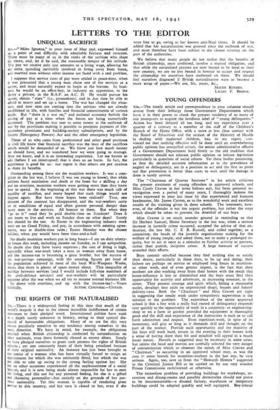LETTERS TO THE EDITOR
UNEQUAL SACRIFICE
su,,—" Miles Ignotus," in your issue of May znd, expressed himself on a point of real difficulty with admirable fairness and restraint. There must be many of us in the ranks of the services who share his views, and, let it be said, the reasonable temper of his attitude. The pay we receive only just amounts to a living wage, allowing for the extra spending inevitably involved in living away from home, and married men without other income are faced with a real problem.
I suppose that service rates of pay were settled in peace-time, when It was presumed that a young man chose one of the services as a career, and must naturally expect to begin at the bottom. In busi- ness he would be an office-boy, in industry an apprentice, in the Army a private, in the R.A.F. an AC. II. He would pursue his career, obtain" rises" (i.e., promotions), and in due time be able to afford to marry and set up a home. The war has changed the situa- tion, and now men are coming into the services who are already established in life, with families and financial commitments of various kinds. But "there is a war on," and national economy forbids the raising of pay at a time when the forces are being numerically increased. The problem was met to some extent at the outbreak of war by the provisions making it possible to postpone payment of life- assurance premiums and building-society subscriptions, and by the Courts (Emergency Powers) Act and the other emergency legislation.
Those of us who came from professional and other good positions in civil life knew that financial sacrifice was the least of the sacrifices which would be demanded of us. We knew just how much money we should have, and we wondered how we were going to manage. Now we know, and it is an interesting experience. Let me hasten to add (before I am interrupted) that it does us no harm. In fact, the experience is good for us: our regret is that others are pot anxious to share its benefits.
Outstanding among these are the munition workers. It was a com- plaint in the last war, I believe (I was too young to know), that while soldiers faced mutilation and death at the front for a shilling a day and no overtime, munition workers were getting more than they knew how to spend. At the beginning of this war there was much talk of equality of sacrifice, and many hoped that such things would not happen again. But have these hopes been realised? True, one element of the contrast has disappeared, and the war-workers carry on in conditions of equal and often greater personal danger than many men in the services. All honour to them. But when they "go to it" need they be paid double-time on Sundays? Does it cost more to live and work on Sunday than on other days? Surely that should be the test. At Easter in the engineering industry work went on on Good Friday, and pay, in accordance with existing agree- ments, was at double-time rates ; Easter Monday was the chosen holiday, when pay would have been time-and-a-half.
No doubt munition workers put in long hours—I am on duty ninetys six hours this week, including sixteen on Sunday, so I can sympathise. No doubt also they have heavy expenses ; the cost of living is high, especially when war-work takes a man or woman away from home, and the income-tax is becoming a great leveller, but the success of the war-savings campaign, with the amazing figures per head of the population achieved in most of the local War-Weapons Weeks, shows that there is plenty of spare money about. This inequality of sacrifice between services (and I would include full-time members of the civil-defence services) and war-workers will be particularly apparent after the war when we all try to resume normal business life.
So down with overtime, and up with the income-tax!—Yours


























 Previous page
Previous page